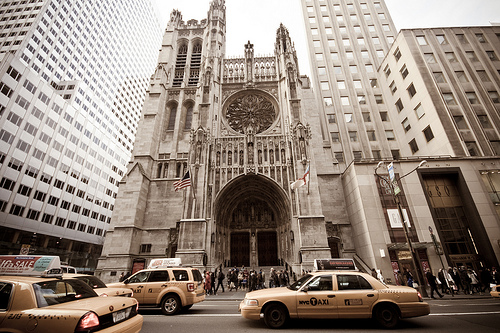One of the foundation pillars of modern thought and contemporary Western identity is the myth of our hyper-individualist autonomy.
Let me say that another way. We think we are very special and unique and that we make all our own decisions about what we like and don’t like thank you very much.
Now, various theories try to put some constraints on that. Marxism and socialism phrase everything in terms of class warfare or some similar playing field. Still, the underlying assumption is that, except for how much money you have (or don’t have), you are pretty much autonomous. Break this one piece of the framework and all our “predestination” falls away and we are free. In this sense, Capitalists (via the free market) and Socialists (via wealth distribution) are trying to achieve the same sort of “freedom” through different means.
Except that this is all a silly story we tell ourselves. We are born into a myriad of constrains that shape who were are, how we think, and what we do for our years on earth. And these constraints are often a good thing – they are what keep us glued together. We NEED each other to survive. But what keeps us glued together? The very things that keep us glued in place and immovable.
One problem with sectarianism in the church (predominant in contemporary Protestantism, but showing up everywhere), is that it tries to use long creeds and confessions to build a “community of like-minded individuals”. You’ve probably heard that phrase before or something like it. But “a people held together by the relative homogeneity of their theology” is no way to build a family. You may say that this is decent indicator of other things since so much springs forth or is implied by theological distinctive, but I think the case for that is nearly always WAY overstated. Presbyterians are really not so different from Pentecostals or Roman Catholics as they insist. Sure, our theological distinctive keep some of us together, but there are so many other things, perhaps more powerful than that.
What keeps us stuck to each other in communities?
- Proximity as glue (geography, space or lack of space, the great uniter)
- Culture as glue (that’s kind of vague, sorry)
- Formal theology as glue (creeds, confessions, institutions)
- Folk theology as glue (“Jesus take the wheel”, pseudo-karma, “Believe in yourself”, etc.)
- Visual likeness as glue? (race, faces, clothes, appearance. This glue is thinner than in past centuries.)
- Promises as glue. (Marriage vows, church membership covenants(!), promises of care from parents to children)
- Slave –> Master as glue? (Not much anymore. But very real when the New Testament was penned.)
- Borrower –> Lender as glue. (This one is hugely dominant today and it usually feels like a cage.)
- Language as glue. (So ubiquitous, it’s often forgotten. The words we use keep even the most bitter enemies so very close to each other.)
With so many different avenues, we ought to be able to find a hundred things to help us relate to people that are still very different from us in two or three areas. I’m arguing for a more holistic approach to relating to our Christian brothers and sisters. Don’t gloss over your formal theological distinctions – they are real and significant. But don’t inflate them into something larger than life. Doing so only serves to divide us from our neighbors – make them more difficult to love.

